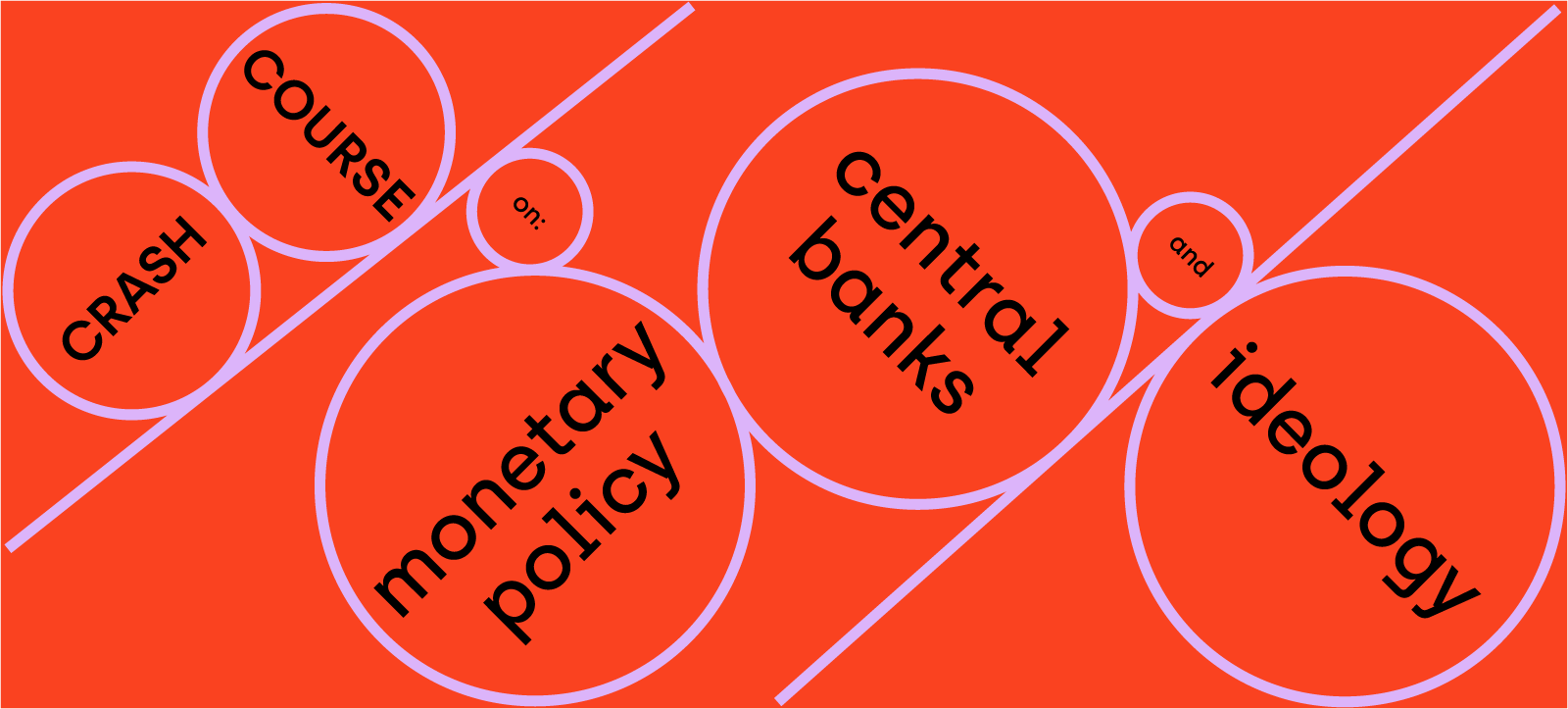
#1 Crisis, central banks and democratic control: the building blocks for change — with Jens van’t Klooster
For this first webinar of our series on monetary policy, central banks and ideology our guest was Jens van ‘t Klooster from KU Leuven. During the presentation and Q&A we discussed issues of unconventional monetary policies. We asked whether anything has changed after the Covid-19 crisis interventions and what this could mean for future central banks decisions and their relations with other institutions.
Jens van ‘t Klooster started by explaining the historical origins of central bank independence. Joined by the moderators and attendees he tried to figure out how we could regain democratic control. What would progressive monetary policies look like? What are the necessary ingredients?

Jens van 't Klooster is a Research Foundation — Flanders postdoctoral researcher at KU Leuven and member of the research group ‘A New Normative Framework for Financial Debt’ at the University of Amsterdam. Jens' research fits somewhere between normative political philosophy and political economy.
Podcast
Transcription
(Note that this is a summary, not a verbatim transcript)
What is Monetary Policy, what Happened after 2008, What is the alternative, and the Big question: Where does the money go?
The basics
What is money, and explains the different ways we can see money. And the different types of money that exist, with the main distinction being that between Public money (in cash or central bank deposits) and private credit money (in the form of bank deposits and other), and the difference between the two. For instance the facts that Central Banks, other than private banks, do not need to make a profit from their lending. They can also not go bankrupt. In the video you will also see the slides of his presentation.
Central banks and public money have developed since 1980’s when the doctrine (Milton Friedman et all) of Price Stability became hegemonic. With only one instrument (interest rate) and obliging transmission via banks. Jens also shows where and how the money from Central Banks goes: via private banks to mainly large corporations. After 2008 there was an explosion of Central Bank Balance Sheets. And now this happens again with the corona-crisis, but with some differences that might be positive and should be encouraged.
On the politics of all this
The policies of the Central Banks are often depicted as being neutral, but of course political choices are mede and there are interests behind these choices what choices are made and by whom? ECB for instance has not bought up Greek debt. Central banks try to avoid politics, and follow the market. Eg Central Bank of Japan, EU. Money is always political, example of ECB CSPP program that has an environmental footprint, eg. support for fossil fuel companies, car companies. Bank of England, same story.
How Central Banking is changing
Covid crisis, aggressively issuing money, openly to governments also (UK, EU) Pandemic Emergency Purchase Program. Now there is a tension between constitutional apolitical embedding and new ways to steer Central Banking that are more democratic.
Q&A
Rodrigo: QE caused all kind of problems: wealth inequality, the money went to big firms, spill over to emerging economies (rising debt levels there). Now again a sharp increase, is it more of the same or are lessons learned?
Jens: That is the question. The problems are clear now, like how low interest raises asset prices and and thus inequality, and many more, the exporting of chaos tot global south... Using monetary instruments is a very crude way tot stabilize economies. But now something slightly different might be happening. The crisis is also different: not a banking crisis, but a real economy crisis. Central Banks are quite supportive of governments now in providing funding. Maybe they have learnt something form previous crisis.
Rodrigo: This always happens when there is an urgent necessity, a crisis. But the FED in US is now mandating private funds to buy assets, a much wider set of assets and thus inflating the stock market directly, one should say not much lessons learnt there?
Jens: In a crisis the ability to react is limited and there is strong dependence on the private sector. There was no option to not save the banks in the previous crisis, for instance. But who pays the bills? The lesson should be: be less dependent on the private sector. In US now they are asking asking Central Bank to prop up private business, this is not the case in the EU.
Sara: On the one hand we have Central Bank as ‘neutral’ institutions, but on the other hand we see ‘targeted QE’ and the need to democratize. What are the ways to achieve the latter.
Jens: The big question: Market neutrality is not really in the mandate. They could fill that in differently. There is immense amount of room for that. The ‘neutral’ practice does have all kind of real impact. Maybe you shouldn’t try to be ‘neutral’? It is not a case of small changes in mandate, but of having extensive societal input: Member states of the EU could have more input, as would the European Parliament, or a more regular process of abiding input into the mandate.
Sara: Is there an example of a Central Bank doing a great job, in your view?
Jens: Take climate issue: there are not many Central Banks taking that serious in their monetary policy. Banking regulation has progressed a bit more. There is a clear ‘community of Central Bankers’ sharing ideology and practice. Now that is shifting, green topics are coming more into view.
Questions from other participants
Participants could comment in the chat, and put questions in a special Q&A where other participants could favor specific questions.
Jens: Different great questions, such as on monetary policy and QE raising asset prices and thus enlarging inequality and if there would be another way for a Central bank to react on a crisis.
The current view is that Central banks do QE, buying bonds, this drives up asset prices, some investors will be influenced. First step now is buying government bonds, but governments are not spending. Why not do the same while governments are spending? Then there would be less asset price inflation. Governments are simply not spending enough.
Rodrigo: Money spent by Central Bank is the debt of its citizens, why is it not not democratically controlled then? And related to that: how is the leadership of Central Banks appointed?
Jens: Decision making power is now concentrated at the heads of the Central Bank, who get a mandate for that. This is not democratically accountable. Central Bankers get appointed by governments, also in the EU (by the governments of the member states). But once you are appointed you are independent.
Sara: A question on democratizing money, in EU case, are there any intermediate steps?
Jens: Most ambitious would be to change the ECB mandate. This would demand to change the whole treaty. A bit less ambitious is to formulate economic policies of the EU and in the EU and demand the ECB to support those. The EU can spell out those objectives and put them in front of the ECB. Thirdly the European Parliament could do so much more (he gives examples: regime of asking questions to president, sanctioning, etc.
Rodrigo: on the problem of inflation and ‘Minsky’s paradox’.
Jens: Central banks keep a close watch on consumer prices, not so much on asset prices. The question is if you want to politicize that, for instance including real estate prices. It might be better not to include those in inflation target, because they distort the view on how the economy is faring.
Inflation is now not so much an issue, but it is a question if the mandate should only be that field and not a much broader range, such as climate policy, social welfare etc.
Rodrigo: But leaving Real Estate and stock prices and such out of the equation means neglecting many of the negative results of the policy? Especially on the short run?
Jens agrees, there is a lot going wrong with for instance urban housing prices. But that is not mainly a problem of inflation it has to do with housing markets, inequality etc.
What about North vs South, we are talking tweaking the relation between democracy and Central Banking in the EU, but lower and middle income countries are also trying QE, and this could turn out very bad with lack of control. Should we want that kind of policy instruments?
Jens: Very serious concern. Emerging markets are incredibly dependent on global dollar system, Jens describes the destructive dynamic of the massive inflow of QE money. The ‘Northern’ Central banks are not held accountable for this. There should be all kind of Global institutions that are able to address these...
Sara: On the perspective of the corona-crisis, that has changed something, finally (tax)money being produced for the benefit of civilians?
Jens: He has an optimistic view: The European Commission is now giving out bonds to spend the money on recovery and green agenda and so on. Could even also be for benefits in the ‘rest of the world’. And the ECB could buy these bonds, there is nothing in the mandate blocking that. But the European Commission is of course not a neutral body, there are interest there and especially the Dutch have been blocking all these positive changes. For progressives in the Netherlands this should be high on the agenda.
Our new Crash Course on monetary policy, central banks and ideology is a platform designed to open up debate on how we can move out of the current crisis and make the necessary steps towards achieving social, economic and ecological justice. Crash Course is inviting global experts on monetary policy to break down complex issues in lay terms and make them accessible to all so that we can understand how to shape our global monetary policy for a fairer future.
